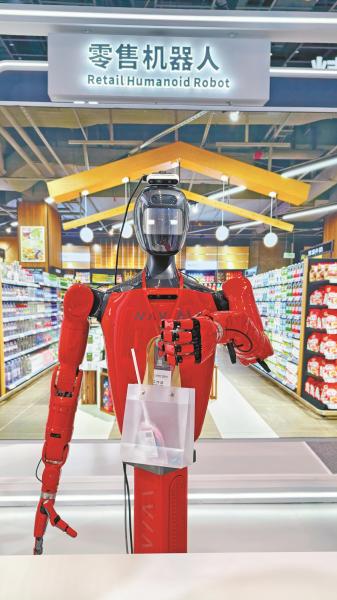
Retail Humanoid Robot at the 4th China-CEEC Expo. (Photo by Tang Yan)
Yesterday evening, the 4th China-CEEC Expo concluded successfully in Ningbo.
Alexander Brankov, an exhibitor representing Serbia's Vet Planet brand, paused intentionally in front of Conference Room 102, Area B of the Ningbo International Conference Center, capturing the image of this symbolic "China Gate" on his mobile phone.
It was at this very site three days ago that he signed a procurement agreement worth over RMB 200 million with Ningbo Free Trade Zone Ba Er International Trade Co., Ltd. This marked the historic entry of Serbian-made pet healthcare products into the Chinese market. Previously, strict ingredient access restrictions posed significant challenges, making it difficult for such products to penetrate the Chinese market. Starting in 2024, Vet Planet joined forces with their Ningbo-based partners to overcome technological challenges and refine several product formulations. They successfully launched "China-exclusive" pet healthcare products, including tear stain removal eye drops and gastrointestinal conditioning paste.
"We have meticulously prepared nearly 100 pet healthcare products adhering to Chinese standards, encompassing everything from dogs and cats to exotic pets."Brankov gently stroked the Chinese label on the exhibit, his gaze intense,"Behind this gate lies the vast RMB 300-billion blue ocean of China's pet industry."
The "breakthrough journey" of a pet healthcare product vividly mirrors Ningbo's 11-year commitment to advancing collaboration between China and Central and Eastern European countries.
This year marks the 50th anniversary of diplomatic ties between China and Europe. The "golden channel" originating in Ningbo is becoming a dynamic testament to China and Europe's efforts in building a shared future for humanity.
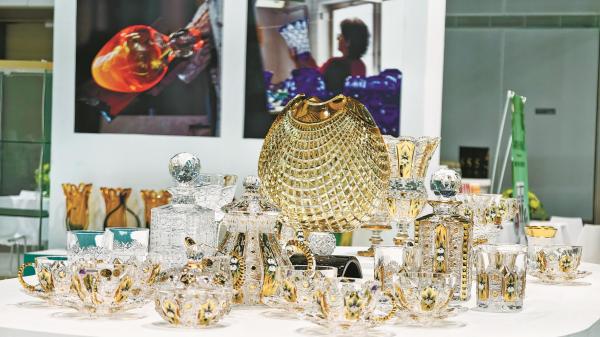
Featured Products from CEE—Crystal Wares. (Photo by Tang Yan)
From "Testing the Waters" to "Diving Deep"
In June 2014, the Ningbo International Convention and Exhibition Center hosted the inaugural exhibition of specialty goods from CEE.
Before stepping into the exhibition hall, the rich fragrance of Bulgarian rose wine, the delicate sweetness of Slovakian mead, and the full-bodied aroma of Hungarian Tokaji noble wine intertwined to create an exotic allure. In front of the booths featuring Polish cookies and Slovak chocolate biscuits, long lines of tasters formed. However, inquiries about prices were scarce—comments such as "The name of this wine is hard to pronounce" and "The cookies are too sweet" were heard. Exhibitors clenched calculators in hand, their eyes reflecting both anticipation and unease.
This marked the "first large-scale matchmaking event" between China and CEE, symbolizing a "mutual exploration" in bilateral trade relations.
At that time, the Chinese import market was dominated by French red wine and Italian cheese, while goods from CEE entered like "outsiders" at an unfamiliar gala.
Chen Yi, a "dedicated participant" at the China-CEEC Expo for 11 years, recalls vividly that when she launched the first CEE Product Pavilion in Ningbo in 2015, it took over two months to sell the initial batch of 20,000 bottles of imported Polish milk. "I was truly anxious," she admitted,"At the time, no one believed that milk from CEE could ever make its way into the refrigerators of Chinese households."
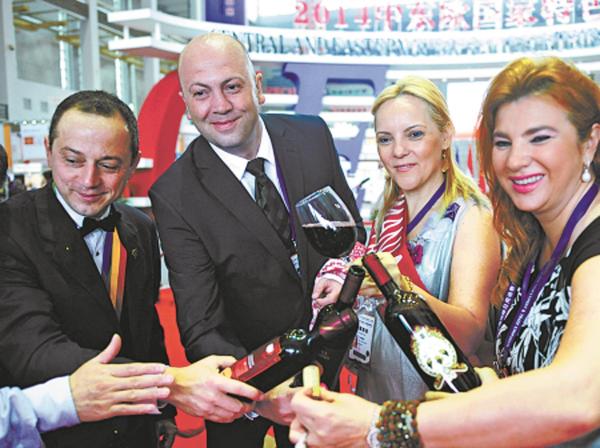
In 2014, at the Central and Eastern European Countries Specialty Commodities Pavilion, company representatives from participating nations enthusiastically promoted their products. (Photo by Ding An)
Ningbo's strategy to break the impasse lies in persistent and meticulous efforts—
Establishing connectivity: Launching a direct passenger flight route to Budapest, and forging a "maritime partnership" between Ningbo Zhoushan Port and five ports in CEE; by the end of 2024, the 'China-Europe Express' will reach Wilhelmshaven, Germany, in just 26 days. Through multimodal transport, goods can be delivered to key CEE countries like Hungary, the Czech Republic, and Poland within 30 days, cutting 12 days off the traditional route;
Reforming regulations: Customs introduced the pioneering 'CEE One-Stop Customs Clearance' service, reducing customs clearance times for agricultural and food products by 40%, and expanding the number of approved commodities from 20 to 126 over the past decade;
Fostering an ecosystem: A 32,000-square-meter, Central and Eastern European Specialty Commodities Perennial Pavilion has been established, featuring 70 traders, 37 national pavilions, and 5,000 product varieties, creating a "Never-ending Expo".
Over the years, Polish milk sales have soared from 10,000 bottles per month to tens of millions of bottles annually. Distribution has expanded from Ningbo to 3,000 supermarkets nationwide; Hungarian Tokaji noble wine, renowned for its unique flavor, now graces Michelin restaurant wine lists, while Slovenian ski gear has found its way into northern China's ski resorts, gaining popularity among winter sports enthusiasts...
Chen Yi's "shopping cart" has long surpassed dairy products, expanding into beauty and skincare items, with agency brands spanning four CEE countries.
"Now, 20,000 bottles of milk are nothing; even 20,000 bottles of cosmetics sell out in less than two months!" Standing at the 4th China-CEEC Expo, the large screen behind her loops a map of "CEE +"—what began as a "first encounter" through flavors has blossomed into a prelude for reshaping trade dynamics.
According to data from the Ministry of Commerce, since the inception of the China-CEEC cooperation mechanism in 2012, trade between China and CEE countries has grown at an average annual rate of 8.1%. Two-way investment now totals nearly USD 20 billion, with increasingly diversified fields of cooperation...
Taking Ningbo as an example, in 2024, its imports from CEE countries reached RMB 12.1 billion, marking a 7.5-fold increase compared to 2014. The average annual growth rate stood at 23.9%, with its share of national imports rising significantly from 1.4% to 5.5%.
Over the past decade, the container throughput along the maritime shipping route connecting Ningbo Zhoushan Port and the five CEE ports has expanded by 2.3 times. The green channel dedicated to food imports from CEE has successfully reduced customs clearance time by 40%.
Through steady efforts and gradual progress, Ningbo continues to strengthen its competitive edge.
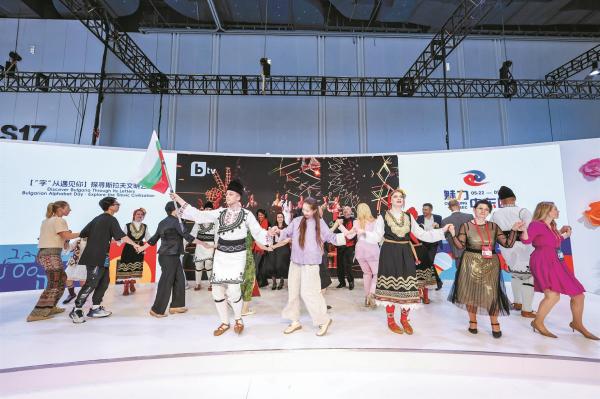
Young People from Various Countries Showcased Graceful Dances at the Expo. (Photo courtesy of the Expo Executive Committee)
From "Trade" to "Symbiosis"
Perspective turning westward.
On March 10,Loznica, Serbia.
Minth Group hosted an inauguration ceremony for its new factory, where Serbian President AleksandarVučić delivered a keynote address. He expressed hope that the factory would contribute to Serbia's economic growth and create more employment opportunities in the future.
No one is surprised by such "national-level aspirations"—since 2021, Ningbo-based Minth Group has directly created 3,500 local jobs in Serbia, achieving revenue of over RMB 700 million last year. It has become a critical component in the European automotive industry chain.
In recent years, despite persistent headwinds against economic globalization, Ningbo's cooperation with CEE countries has demonstrated remarkable resilience.
In 2019, as the sole national-level institutional exhibition in China dedicated to CEE, the inaugural China-CEEC Expo was held in Ningbo. With the theme "Deepening Open Cooperation for Mutual Benefit and Win-Win Outcomes," the event established a foundation of mutual affinity and collaborative spirit between China and CEE.
Previously, concerns revolved around "not being acclimated to the environment," but now efforts are actively directed towards "adapting and enhancing the ecosystem."
A silent transformation has been underway in Ningbo for four years. As the sole China-CEEC Customs Information Center in the nation, the platform has issued over 20,000 bilingual policies and guidelines in Chinese and English. Ningbo Customs, serving as the managing entity, has made trade dynamics and relevant indices between China and CEEC accessible globally. The website has garnered more than 3.6 million visits worldwide.
This "symbiotic logic" has profoundly redefined the essence of trade itself.
On May 15, Ningbo witnessed the inaugural operation of the nation's pioneering '1 Euro to China' intercontinental express delivery service.
Jointly launched by the Procurement Alliance of CEEC Commodity and SF Express, this service features three direct flights weekly, reducing per-kilogram shipping costs from 1.5-2 euros to just 1 euro. Through this air corridor, niche CEE products with high added value and short shelf lives can reach consumers within as little as four days.
"Initially, the idea was merely to sell goods, but later we realized we were actually building a 'bridge,'" said Chen Weijun, Executive President of the Procurement Alliance of CEEC Commodity. The Procurement Alliance, headquartered in Ningbo, acts as a vital link between CEE and the vast domestic market in China. Its extensive warehousing network, strategically set up by over 120 member units in Poland, Romania, Hungary, and other locations, provides a seamless solution for buyers, sellers, and product sourcing challenges. Collaborating with SF Express has effectively addressed critical transportation bottlenecks, particularly for CEE commodities like food. With a sales-driven ordering model, businesses can confidently engage in cross-border shopping.
At the booth of Polish fragrance brand NOU, its culturally sophisticated perfumes, priced at RMB 100, were completely sold out. "We don't compete with major brands on premiums; instead, we specialize in targeting niche market segments," said Ms. Chen, the brand's representative. The brand has successfully gained a foothold in Ningbo's Central and Eastern European Specialty Commodities Perennial Pavilion as well as Shenzhen's K11 Mall, achieving an impressive annual sales revenue of RMB 5 million.
Meanwhile, nearby, Albanian juice brand Ballkan also celebrated a highly successful turnout. The brand has specifically adjusted its production line for the Chinese market, refined its flavors, reduced the acidity of its main products, and partnered with Chinese food processing enterprises to introduce a Non-From-Concentrate (NFC) juice series.
"Wherever there is demand, there is business." Exhibitor Hajdairy said with a broad smile.
Crossing mountains and seas, embarking on a new course, Ningbo possesses its own "golden formula" for success.
From “Physical Connectivity” to “Emotional Connection”
The savory freshness of red paste marinated crab collided with the richness of Balkan sausage, while the aroma of pickled cabbage and yellow croaker intertwined with the hearty flavor of Goulash beef soup... On May 21, a long-table banquet accommodating 100 guests was hosted at Ningbo's Old Bund, offering a "culinary rendezvous" and inaugurating the cultural exchange chapter of the Expo.
Slovak Ambassador to China Peter Lizák could have hardly anticipated that the most "standout" cultural moment for him at this exhibition would be a game of table tennis.
On the afternoon of the 22nd, at the opening ceremony for Slovakia as the Guest of Honor, when reporter Jin Lu navigated through the crowd and found Mr. Peter Lizák standing under the spotlight, he immediately recognized the journalist who had engaged him in a friendly table tennis match in Beijing a week earlier.
"Have you been keeping up with your table tennis practice recently?" he greeted with a smile.
"Of course! Your powerful smash video has gone viral in Ningbo, garnering nearly 10 million views across all social media platforms,"Jin Lu said with a smile as she presented a unique gift. The framed "Chief Interview" page from the Ningbo Daily featured his portrait alongside a memorable quote from the interview:"Slovakia is willing to collaborate with China to explore opportunities in the new energy vehicle sector."
Cultural exchanges transcend not only regional and linguistic barriers but also serve as vital bridges connecting people’s hearts and minds.
At the CEE-themed graphic print exhibition, a visitor from Albania instantly recognized that the seal depicted their national hero, Skanderbeg. "Our heroes are brought to life through the art of Chinese seal carving, which is absolutely extraordinary!" said the visitor.
Lin Er, director of Xiling Seal Art Society, explained that the exhibition integrates iconic buildings, landscapes, prominent figures, and literary and artistic symbols from various countries and regions into the traditional Chinese seal carving art form, skillfully showcasing the cultural elements of 14 CEE countries with the timeless elegance of this ancient craft. "These intricate imprints are not only a distillation of the history and culture of each nation but also a vivid testament to the mutual exchange of civilizations".
The future of cooperation between China and CEE countries remains firmly rooted in the fruitful outcomes of ongoing cultural exchanges and mutual learning among civilizations. During the Expo, the Ningbo-CEE International Cultural and Art Exchange Center was officially inaugurated, bringing together 103 universities and organizations to participate in a series of collaborative activities, including education programs and exchanges of young scientific and technological talent...
"There is a Slovenian proverb that says,'The joy of sharing is doubled when shared.'" Hot, the Deputy Speaker of the Slovenian National Assembly, remarked that the China-CEEC Expo is more than just a commodities fair; it serves as a catalyst for mutual growth and development. We aspire to utilize this platform as an opportunity to foster open dialogue, engage in mutual learning, further expand trade relations in goods and services, and collectively create a future characterized by resilience and innovation.
When JanuszPiechociński, former Deputy Prime Minister of Poland, visited Ningbo for the fourth time, he candidly expressed his sentiment, saying,"This place feels like our second home."
Good friends feel close even when they are thousands of miles apart.
This year marks the 50th anniversary of diplomatic relations between China and Europe, as well as the 11th year of Ningbo's proactive involvement in fostering cooperation between China and CEEC.
Over the past 11 years, this "national-level experiment" has provided answers to three pressing questions of our era:
How can openness achieve sustainability?
——Not merely through policy incentives but by cultivating robust ecological capabilities.
From the Central and Eastern European Specialty Commodities Perennial Pavilion to the "1 Euro to China" intercontinental express service, and from the customs "policy supermarket" to the Youth Innovation and Entrepreneurship Competition, Ningbo has transformed the four-day exhibition into a 365-day uninterrupted global trade expo.
Just as the vitality of the joint construction of the "Belt and Road" initiative lies in its foundation of rule mutual recognition and fostering deep people-to-people connectivity.
How can cooperation navigate through challenges?
——It does not depend on the scale, but on the depth of its foundational roots.
During the pandemic,Minth's Serbian factory ensured the continuity of the automotive parts supply chain; at the end of last year, the "China-Europe Express" set a new record for the fastest transit speed from the Yangtze River Delta to Europe...
Amid repeated external challenges, Ningbo Zhoushan Port has consistently demonstrated its "hard-core strength," proving itself not just as a critical logistics hub but also as a stabilizing force in times of crisis.
How can civilizations achieve coexistence?
——There's no need to deliberately seek uniformity, but rather aim to enlighten and inspire each other.
When the Hungarian VR Park launched its first store in China in Ningbo, when Polish milk became a staple for baking among housewives in the Yangtze River Delta, and when Serbian pet healthcare products found their way into Chinese supermarkets, a "new Silk Road" transcending geographical boundaries has emerged: one that eschews uniformity and fosters new dynamics through cultural interactions and collisions.
As the bell tolled to mark half a century of diplomatic relations between China and Europe, Ningbo has demonstrated over 11 years that globalization has never subsided—it has merely shifted its course. This new course does not depend on hegemony or confrontation, but rather on the resilience of industrial supply chains, cultural empathy, and mutual trust in shared rules.
As expressed in the verse of Nobel laureate and Polish poet Szymborska,"The same star keeps us in reach."
On this shared planet, the story of Ningbo and CEE serves as a vivid embodiment of the concept of a community with a shared future for mankind.
Reported by Shan Yuzifeng for Ningbo Daily's Yongpai Client
Disclaimer:The above content is translated from Chinese version of Ningbo Daily. The Ningbo Daily version shall prevail.
Related News
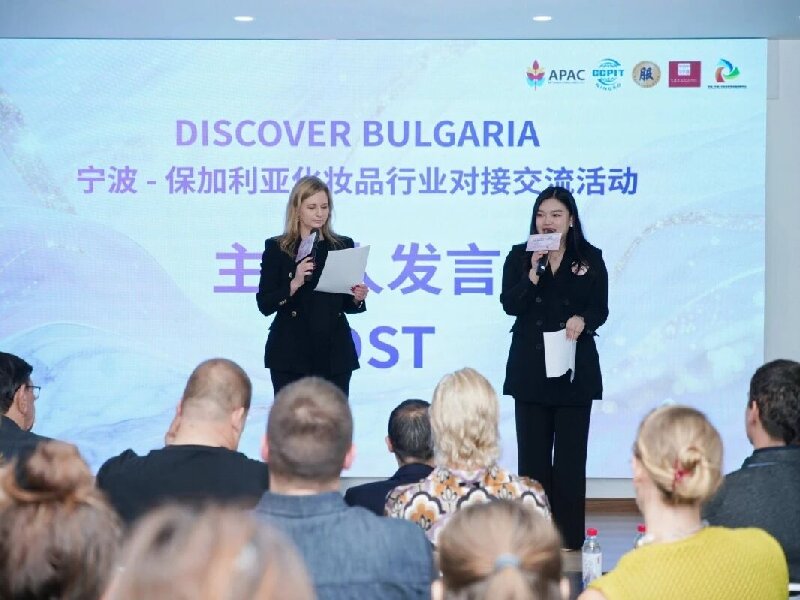
Bulgarian Roses Make a Scent-sation in Ningbo as Businesses Jet In for Collaboration
2025-11-13
On November 8, Bulgarian business representative Mihaela Aprilova jetted into Ningbo for the“Discover Bulgaria Ningbo - Bulgaria Cosmetics Industry Matchmaking and Exchange"

From a presence in five countries to 37 pavilions—a decade has woven the "Silk Road Tapestry" of Central and Eastern European products
2025-07-16
As a leading contributor to the import of Central and Eastern European products within both the city and the province, Beilun District recorded imports and exports of CNY7.87 billion with Central and Eastern European countries from January to May this year, reflecting a 4.4% year-on-year growth.

Aromatic Wine in Ningbo - Alcoholic Products from CEE Are Highly Popular in Ningbo
2025-07-08
According to statistics, the value of alcoholic products imported from CEE countries through Ningbo Port reached 16.172 million yuan in the first half of this year.

Zhejiang Luqiao's M&E Products "Connects" Central and Eastern Europe
2025-06-27
The latest data shows that in the first four months of this year, Zhejiang's import and export growth rate to Central and Eastern Europe exceeded 10%, and the export of M&E products became the "main engine" of growth, with an export value of RMB 30.81 billion, a year-on-year increase of 15.8%, accounting for 54.2% of the province's total export value to Central and Eastern Europe.

Ningbo Meets CEE, New Opportunities Shared—Advancing Practical Economic and Trade Cooperation
2025-06-23
Since 2014, Ningbo has dedicated efforts to hosting the China–Central and Eastern European Countries Expo and establishing the China-CEEC Economic and Trade Cooperation Demonstration Zone.

Benchmark for cross-regional trade cooperation
2025-06-17
Statistics from Ningbo Customs showed that the company's exports to Central and Eastern European countries (CEEC) surged by 17.8 percent year-on-year in the first four months of 2025, underscoring the growing demand for high-quality personal care appliances from these countries.
.jpg)
Mountains and Seas United in Progress | Forging a New Future | The Open Expo • A Demonstration Zone of Shared Success
2025-06-17
Over the past 11 years since inaugurating the first CEEC Specialty Products Exhibition, Ningbo has consistently worked to successfully host the China-CEEC Expo and establish the China-CEEC Economic and Trade Cooperation Demonstration Zone.

After Two Years of Strategic Preparation, This National Exhibition Has Unleashed New Vitality
2025-06-17
From May 22 to 25, the 4th China-CEEC Expo & International Consumer Goods Fair was held in Ningbo, Zhejiang, under the theme "New Visions for the future".
Hot News